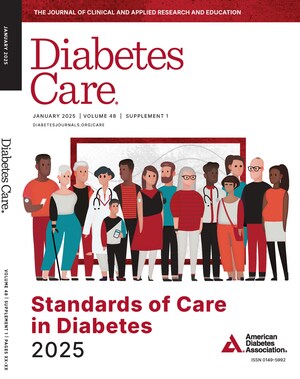The American Diabetes Association®, the American Association of Clinical Endocrinologists, the American Association of Diabetes Educators and the Endocrine Society Strongly Disagree with the American College of Physicians' Guidance for Higher Blood Glucose Targets for People with Type 2 Diabetes
ARLINGTON, Va., March 9, 2018 /PRNewswire-USNewswire/ -- Together, the American Diabetes Association (ADA), the American Association of Clinical Endocrinologists (AACE), the American Association of Diabetes Educators (AADE) and the Endocrine Society strongly disagree with the American College of Physicians' (ACP's) proposed new guidance that suggests higher blood glucose targets for people with type 2 diabetes. While there is agreement on individualization of treatment based on patient-specific factors, with the aim of protecting those at highest risk, the ACP's recommendation of blood glucose targets for A1C "from 7 to 8 percent" could prevent many patients from receiving the full benefits of long-term glucose control. We are also concerned the broad range suggested by ACP's guidance is too large to apply to "most patients with type 2 diabetes" and has the potential to do more harm than good for many patients for whom lower blood glucose targets may be more appropriate, particularly given the increased risk of serious complications such as cardiovascular disease, retinopathy, amputation and kidney disease, which are the result of higher blood glucose (A1C) levels.
While ACP's guidance is only one additional percentage point, this may equate to a difference of nearly 30 points when blood glucose is measured in mg/dl. This difference in the lower and higher A1Cs in the range ACP suggests also has been shown to have clear differences in microvascular complications from large, multicenter randomized trials of patients newly diagnosed with type 2 diabetes.
The ACP's new guidance, "Hemoglobin A1C Targets for Glycemic Control with Pharmacologic Therapy for Nonpregnant Adults with Type 2 Diabetes Mellitus: A Guidance Statement Update From the American College of Physicians," were published in the Annals of Internal Medicine on March 5, 2018. They were developed based on analysis of the same international clinical trials for people with type 2 diabetes (ACCORD, ADVANCE, VADT and UKPDS) reviewed by each of the other organizations, including the Professional Practice Committee for the ADA's 2018 Standards of Medical Care in Diabetes and the recommendations of AACE and AADE. However, ACP's interpretations of the findings of the studies did not account for the differences in the patient populations of these studies.
In addition, their recommendations do not consider the positive legacy effects of intensive blood glucose control confirmed in multiple clinical trials, particularly for those newly diagnosed with type 2 diabetes, and, therefore, are not reflective of the long-term benefits of lower A1C targets. ACP's guidance also does not consider the positive impact of several newer medication classes (SGLT2 inhibitors and GLP-1 receptor agonists) demonstrated in more recent clinical trials to improve mortality and morbidity in high-risk patients with type 2 diabetes. These medications have been associated with low risk for hypoglycemia, have favorable effects on weight and demonstrate improved cardiovascular disease outcomes.
ADA, AACE, AADE and the Endocrine Society remain firmly committed to protecting the more than 29 million Americans with type 2 diabetes from its serious complications by recommending individualized care that can improve their lives and reduce their risk of complications. The human impact of one percentage point is serious—to their daily lives, their families, friends and loved ones—and their long-term quality of life and health outcomes.
About the American Diabetes Association
Nearly half of American adults have diabetes or prediabetes; more than 30 million adults and children have diabetes; and every 21 seconds, another individual is diagnosed with diabetes in the U.S. Founded in 1940, the American Diabetes Association (ADA) is the nation's leading voluntary health organization whose mission is to prevent and cure diabetes, and to improve the lives of all people affected by diabetes. The ADA drives discovery by funding research to treat, manage and prevent all types of diabetes, as well as to search for cures; raises voice to the urgency of the diabetes epidemic; and works to safeguard policies and programs that protect people with diabetes. In addition, the ADA supports people living with diabetes, those at risk of developing diabetes, and the health care professionals who serve them through information and programs that can improve health outcomes and quality of life. For more information, please call the ADA at 1-800-DIABETES (1-800-342-2383) or visit diabetes.org. Information from both of these sources is available in English and Spanish. Find us on Facebook (American Diabetes Association), Twitter (@AmDiabetesAssn) and Instagram (@AmDiabetesAssn).
About the American Association of Clinical Endocrinologists (AACE)
The American Association of Clinical Endocrinologists (AACE) represents more than 7,500 endocrinologists in the United States and abroad. AACE is the largest association of clinical endocrinologists in the world. The majority of AACE members are certified in endocrinology, diabetes and metabolism and concentrate on the treatment of patients with endocrine and metabolic disorders including diabetes, thyroid disease, osteoporosis, growth hormone deficiency, cholesterol disorders, hypertension and obesity. Visit our website at http://www.aace.com.
About the American Association of Diabetes Educators (AADE)
AADE is a multi-disciplinary professional membership organization dedicated to improving diabetes care through innovative education, management and support. With more than 14,000 professional members including nurses, dietitians, pharmacists, exercise specialists, and others, AADE has a vast network of practitioners working with people who have, are affected by or are at risk for diabetes. Learn more at www.diabeteseducator.org, or visit us on Facebook (American Association of Diabetes Educators), Twitter (@AADEdiabetes) and Instagram (@AADEdiabetes).
About the Endocrine Society
Endocrinologists are at the core of solving the most pressing health problems of our time, from diabetes and obesity to infertility, bone health, and hormone-related cancers. The Endocrine Society is the world's oldest and largest organization of scientists devoted to hormone research and physicians who care for people with hormone-related conditions. The Society has more than 18,000 members, including scientists, physicians, educators, nurses and students in 122 countries. To learn more about the Society and the field of endocrinology, visit our site at www.endocrine.org. Follow us on Twitter at @TheEndoSociety and @EndoMedia.
ADA:
Michelle Kirkwood, 703-299-2053
[email protected]
AACE:
Glenn Sebold, 904-404-4122
[email protected]
AADE:
Matt Eaton, 800-338-6366
[email protected]
Endocrine Society:
Aaron Lohr, 202-971-3654
[email protected]
SOURCE American Diabetes Association
Related Links
WANT YOUR COMPANY'S NEWS FEATURED ON PRNEWSWIRE.COM?
Newsrooms &
Influencers
Digital Media
Outlets
Journalists
Opted In






Share this article